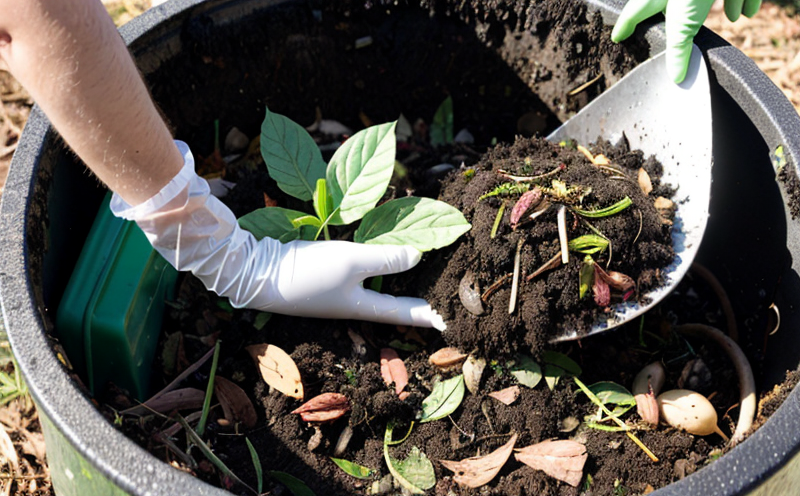ISO 17601 DNA Extraction for Compost Microbial Community Testing
The ISO 17601 standard provides a robust framework for extracting DNA from compost materials, which is essential for characterizing the microbial community within these organic amendments. This service plays a critical role in ensuring that waste management practices are sustainable and meet regulatory standards. The extraction method employed here is designed to preserve the integrity of the DNA while minimizing contamination risks.
The process begins with the collection of compost samples, which should be representative of the intended test parameters. Samples must be handled carefully to avoid introducing external contaminants or altering the microbial community composition. Once collected, samples are processed using a series of mechanical and chemical steps that include disruption of the biomass, nucleic acid binding, and washing phases.
The use of high-quality reagents and controlled laboratory conditions ensures precision throughout the extraction process. The final product is a concentrated DNA solution that can be used in subsequent molecular biology assays such as PCR (Polymerase Chain Reaction) for quantification or sequencing to identify specific microbial strains present in the compost.
By adhering strictly to ISO 17601 guidelines, we ensure accurate and reproducible results. This consistency is crucial for quality managers who need reliable data on microbial community structure, as it helps them make informed decisions regarding waste management processes and product formulations.
The significance of this service extends beyond mere compliance; it contributes significantly to sustainable resource recovery efforts by providing insights into the effectiveness of different composting methods. Understanding how various factors influence the microbial community can lead to improved practices that enhance nutrient availability and reduce environmental impact.
For R&D engineers, this service offers valuable information about potential improvements in compost production techniques. By analyzing the microbial diversity before and after treatment steps, they can identify bottlenecks or areas for optimization. This knowledge also supports efforts towards creating more efficient waste management systems that align with global sustainability goals.
In summary, ISO 17601 DNA extraction is an indispensable tool in modern compost microbiology research and regulatory compliance. It enables precise characterization of microbial communities within compost materials, offering crucial insights into both current state and future development trends.
Industry Applications
| Application Area | Details |
|---|---|
| Waste Management | Evaluating the effectiveness of composting processes in reducing waste volumes. |
| Agriculture | Determining beneficial microbial populations that enhance soil fertility and plant health. |
| Environmental Monitoring | Identifying changes in microbial communities resulting from different environmental conditions. |
| Pharmaceuticals | Assessing the presence of pathogenic microorganisms in bioactive compounds derived from compost. |
| Biotechnology | Characterizing genetically modified organisms (GMOs) that may have escaped into compost systems. |
| Sustainable Development | Supporting initiatives aimed at reducing landfill waste and promoting circular economy models. |
Competitive Advantage and Market Impact
Adopting ISO 17601 DNA extraction for compost microbial community testing offers several competitive advantages. Firstly, it enhances the reliability of product offerings by ensuring consistent quality across batches of compost produced under varying conditions. Secondly, it facilitates compliance with international standards such as ISO 14001:2015 and OECD Guidelines for Testing of Chemicals, which are increasingly demanded by regulatory bodies worldwide.
From an operational perspective, this service helps companies stay ahead of market trends by providing early access to cutting-edge technologies. It enables them to innovate faster through better understanding of microbial dynamics within their products. Furthermore, it supports strategic partnerships with academic institutions and research organizations dedicated to advancing knowledge in environmental microbiology.
In terms of market impact, the ability to accurately assess compost quality using ISO 17601 ensures that businesses can confidently meet customer expectations for environmentally friendly solutions. This aligns perfectly with growing consumer demand for eco-friendly products and services. Moreover, it opens up new opportunities for collaboration within industries seeking sustainable alternatives to traditional waste disposal methods.
Overall, incorporating this service into your operations not only strengthens your position in existing markets but also positions you as a leader in innovation and sustainability within the broader agricultural and environmental sectors.
Use Cases and Application Examples
In practice, ISO 17601 DNA extraction is applied across diverse scenarios where accurate microbial profiling of compost materials is necessary. One common application involves evaluating the performance of different composting facilities by comparing their output against predefined standards.
An example from agriculture includes testing compost used as soil amendment to determine its efficacy in promoting beneficial bacteria that suppress diseases affecting crops like tomatoes or strawberries. Another case study could involve monitoring the decomposition rates of organic waste in municipal landfills, helping municipalities optimize their recycling programs.
For pharmaceutical companies, this service ensures stringent hygiene standards are maintained during production processes involving compost-based ingredients. In biotechnology firms, it assists in tracing genetically modified organisms (GMOs) through complex supply chains to prevent accidental contamination events.
The versatility of ISO 17601 DNA extraction makes it applicable not only within specific industries but also across multiple sectors. Its role in promoting sustainable practices underscores its importance in addressing global challenges related to waste management and resource efficiency.





